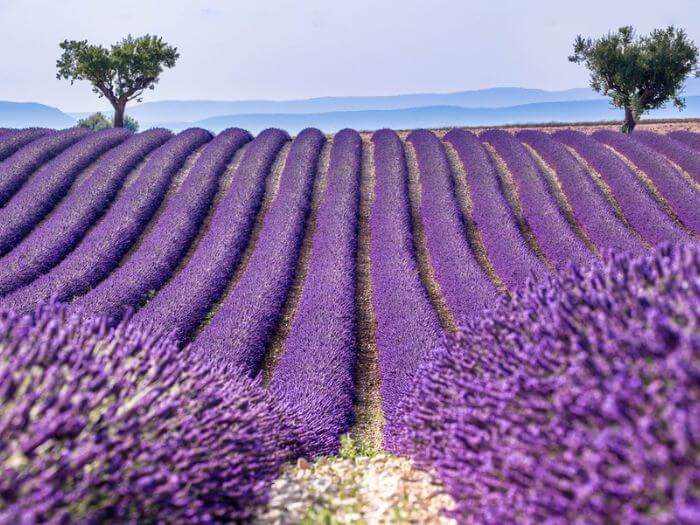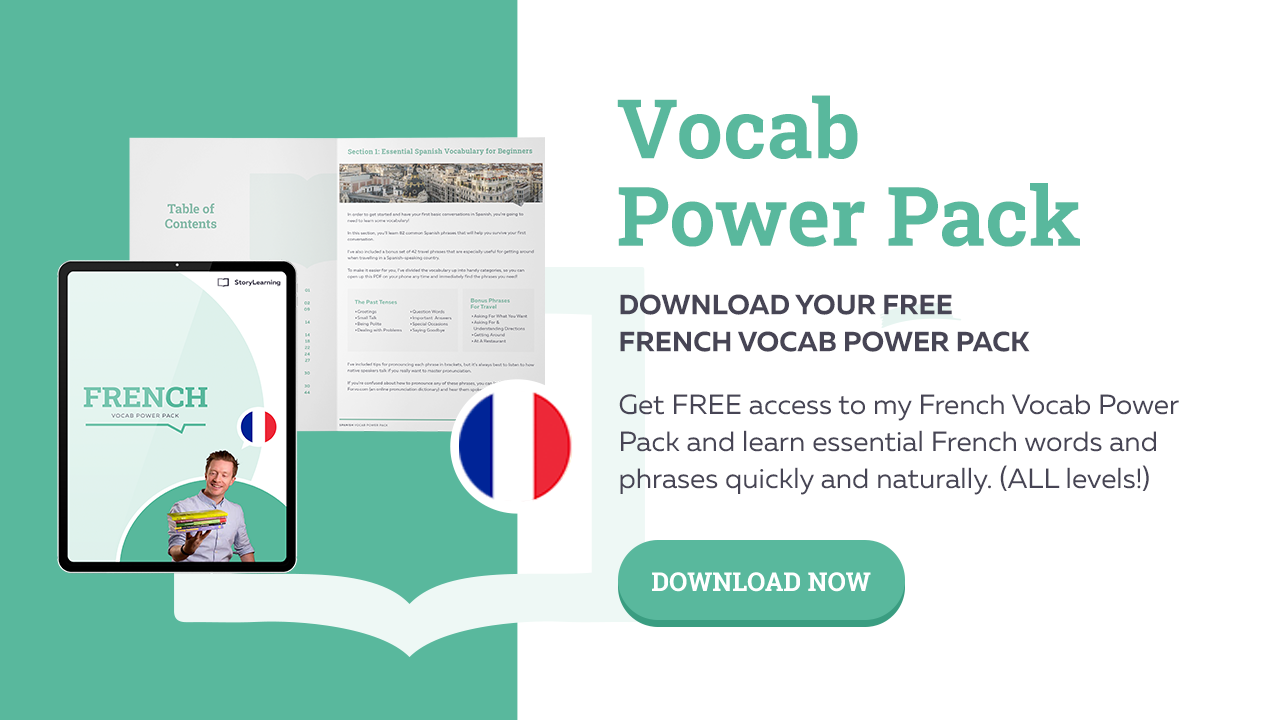When you learn French, as you move from beginner through intermediate and onto advanced, one thing you can’t escape is the need to learn more words.
Of course, it’s possible to express yourself well enough with more limited amounts of vocabulary along with an ability to describe what you’re talking about. And knowing a few handy all-purpose words like “thing”.
However, there comes a time when you want to be able to express yourself clearly using the right words without resorting to such coping measures, at which point, you’ll need to make sure you know enough advanced French vocabulary.
But how do you learn enough words to move to an advanced level? Which words should you learn first? And what learning strategy should you have?
In this post, I’ll help you with these questions and more as I tell you everything you need to know about advanced French vocabulary.
Pro Tip
By the way, if you want to learn French fast and have fun, my top recommendation is French Uncovered which teaches you through StoryLearning®.
With French Uncovered you’ll use my unique StoryLearning® method to learn French through story…not rules. It’s as fun as it is effective. If you’re ready to get started, click here for a 7-day FREE trial.
How To Learn Advanced French Vocabulary

So what’s the best way to enlarge your vocabulary?
Well, let me start by telling you the worst way – and that’s to learn long vocab lists that aren’t relevant to you and that don’t have any context.
Instead, you should learn words as you meet them naturally in context through your daily contact with the language. This is what the StoryLearning method is all about.
However, you also need to be selective, because you can’t hope to remember every new word you meet. So you need to learn to notice new words you think are interesting or useful to you and then try to retain those.
Let me give you an example.
Extensive reading – reading lots of French books and skipping over the bits you don’t understand rather than studying a short text intensively – is one of the best ways of improving many areas of your French, including your vocabulary.
But one of the keys to this is not stopping to look up every word you don’t know in the dictionary and writing it down.
Instead, you try to use the context to guess what a word means and carry on reading – and you only look up words that are vital to your understanding of the text. Otherwise, you don’t worry about them.
However, you should also notice interesting or useful words that you didn’t know before but want to learn and then perhaps note down just a few each time you read.
That way, you will learn the kind of words you want to know, and you’ll have a better chance of remembering them.
Which Advanced French Vocabulary Should You Learn?

But which words should you choose? Well, that’s up to you. But here are some pointers.
Try to learn the kind of words you think you’ll use most, but also try to learn words you think are interesting or that stand out to you in some way.
If you’re a keen ornithologist, you might want to learn the names of birds you notice when reading articles about birdwatching. But if you’re more into technology, you might want to learn words related to that instead
Words that are culturally relevant are also extremely useful, and you’ll find several examples later in this post.
There’s no right answer, but you shouldn’t just learn lots of random words from a field you know nothing about because you’ll never use them. And you probably won’t remember them either.
In the rest of this post, I’m going to give you a few suggestions for the types of word I think you should learn, and I’ll explain why I think so.
However, this is not a list of ‘words you must learn if you want to speak advanced French’ but rather is intended as a guideline to the kinds of words you should look out for and notice during your daily experience of using French. So let’s get started!
Advanced French Expressions With Avoir

In French, there are several expressions using the verb avoir that you will need to learn as your language level progresses. Some of them are useful expressions in their own right while others can give your language a bit more variety.
A good example of this is the first one, avoir envie de, which can be used instead of always using vouloir (to want).
1. Avoir Envie De (To Feel Like Doing)
- J’ai envie d’aller à la plage demain (I feel like going to the beach tomorrow)
2. Avoir Honte (To Be Ashamed)
- J’ai honte de mon gros ventre (I’m ashamed of my fat belly)
3. Avoir L’Intention (To Plan To)
- Il a l’intention de passer l’examen l’année prochaine (He’s planning to take the exam next year)
4. En Avoir Marre (To Be Fed Up)
- J’en ai marre de cette pluie qui ne s’arrete jamais (I’m fed up with this rain that never stops)
Other Useful Advanced French Verbs

When you start learning French, you learn basic verbs like faire (to do, to make) and mettre (to put). However, knowing some lower-frequency verbs will allow you to talk about more actions and describe what’s going on more accurately.
Here are a few examples of these kinds of useful verbs – although, of course, there are many more French verbs including irregular French verbs.
5. Bricoler (To Do DIY, Potter About)
- Mon armoire est cassée, mais ce n’est pas grave parce que mon père bricole bien, alors il peut la réparer (My wardrobe is broken, but it’s not a big deal because my father is good at DIY, so he can fix it)
France is a nation of bricoleurs, which can be roughly translated as “DIY enthusiasts”, so this is a good cultural word to remember.
6. Chuchoter (To Whisper)
- Il faut chuchoter parce que le bébé est en train de dormir (We have to whisper because the baby is sleeping)
7. Jurer (To Swear)
- Je vais le faire demain, je te le jure (I’m going to do it tomorrow, I swear it (to you)
This word can also be used in the sense of “say a swearword”.
8. Avouer (To Admit)
- C’est lui qui l’a fait et il l’a déjà avoué (He’s the one who did it, and he’s already admitted it)
Be careful with this one. Admettre usually means “admit” in the sense of “let in” and not in the sense of “own up to, confess”. However, it can sometimes be used in the sense of “accept”, which is very close to the sense of “own up to, confess”.
9. Se Débrouiller (To Get By)
- Je ne parle pas très bien la langue mais je peux me débrouiller (I don’t speak the language very well, but I can get by)
10. Gêner (To Bother)
- Ça te gene si je fume ? (Does it bother you if I smoke?)
11. Se Moquer De (To Mock, Make Fun Of)
- Tu te moques de moi ? (Are you making fun of me?)
Pay attention to the construction of this one because it doesn’t work like the English verb “to mock”.
12. Parier (To Bet)
- Je te parie qu’il ne viendra pas (I bet you he doesn’t (won’t) come)
13. Éclater De Rire (To Burst Out Laughing)
- Il a exclaté de rire quand il l’a entendu (He burst out laughing when he heard it)
14. Exagérer (To Exaggerate, Go Too Far, Push It)
- N’exagère pas ! Je ne vais pas faire tes devoirs pour toi ! (Don’t push it! I’m not going to do your homework for you!)
This is an extremely common verb that native speakers often use that doesn’t always translate well into English.
The literal meaning is “exaggerate”, but it’s closer to something like “go too far” or “push it” in the sense of asking for too much.
The fact that it’s not a word that English speakers would necessarily think to use in this situation makes it a good advanced word to know.
Advanced French Adjectives

Learning some interesting French adjectives beyond things like grand (big, tall) or joli (pretty) is an excellent way to give your French a bit more flavour – and it’s vital if you want to reach more advanced levels.
Here are just a few examples of the kind of thing to look out for, but of course, there are hundreds more.
15. Crevé(e) (Tired, Knackered)
- Vous avez marché dix kilomètres ? Vous devez être crevés ! (You walked ten kilometres? You must be knackered!)
16. Épuisé(e) (Exhausted)
- J’arrête de travailler. Je suis épuisé (I’m stopping work. I’m exhausted.)
17. Chouette (Great, Fantastic)
- Tu peux venir ? Chouette ! (You can come? Great!)
18. Minable (Pitiful, Pathetic, Meagre)
- Je n’arriverai jamais à acheter une voiture avec mon salaire minable (I’ll never manage to buy a car with my pitiful salary)
19. Gonflé(e) (Have A Nerve)
- Il est gonflé de venir à la fête sans invitation (He’s got a nerve coming to the party without an invitation)
20. Décevant(e) (Disappointing)
- J’ai regardé le film et je l’ai trouvé décevant (I watched the film and I found it disappointing)
21. Moche (Ugly)
- Son nouveau copain est très moche (Her new boyfriend is very ugly)
This more informal word for “ugly” is far more common in normal speech than the more formal laid.
22. Doué(e) (Gifted, Talented)
- Il est très doué pour les langues (He’s very talented in languages)
Advanced French Vocabulary: Adverbs
Here are just two important French adverbs I’d like to mention.
23. Franchement (Frankly)
- Franchement ça ne m’intéresse pas du tout (Frankly that doesn’t interest me at all)
This is used far more often in French than in English.
24. Actuellement (Currently)
- Il n’est actuellement pas au bureau (He’s currently not in the office)
A false friend to beware of. This word is never translated as “actually”.
Advanced French Vocabulary: Animals

Chien (dog) and chat (cat) are likely to be among the first words most people learn, but how about some other less common animals?
Interestingly, the way French and English group certain animals doesn’t always correspond exactly, as you’ll see from some of these examples, and noticing differences like these can be a good way to pick up more advanced vocab.
25. Un Chameau (Camel With Two Humps)
26. Un Dromadaire (Camel With One Hump)
In French, a camel with one hump is called a dromadaire. Chameau should technically only be used when referring to a camel with two humps (although some native speakers might still get this wrong!).
27. Un âne (Donkey, Ass)
28. Un Cachalot (Sperm Whale)
Although English considers these animals whales, in French, you should use the word cachalot and not baleine (whale).
29. Un écureil (Squirrel)
30. Un Guépard (Cheetah)
31. Un Léopard (Leopard)
32. Un Babouin (Baboon)
Advanced French Vocabulary: Body Parts
When it comes to something like body parts, everyone knows the basics like bras (arm) and jambe (leg). But you might not ever think about some of the less frequent ones until you need to use the word and realise you don’t know it.
Here are a few examples.
33. Le Cou (Neck)
34. Le Cul (Arse)
Be careful with your French pronunciation when you say cou and cul. English speakers often confuse the sounds of these words – sometimes with rather amusing results!
35. Le Front (Forehead)
36. Le Pouce (Thumb)
37. Un Orteil (Toe)
Toes are also sometimes called doigts de pied, which literally means “fingers of the feet”.
38. Un Cil (Eyelash)
39. Un Sourcil (Eyebrow)
40. La Cheville (Ankle)
- Je me suis tordu la cheville (I’ve twisted my ankle)
41. Le Coude (Elbow)
42. Le Talon (Heel)
43. Une Fesse (Buttock)
- Bouge tes fesses ! (Move your butt!)

Advanced French Vocabulary Jobs And Work
There are so many names of jobs to learn, and you can easily look up the ones that you need to know in a dictionary. However, here are some important cultural words from the world of work you’ll need to know if you want to speak advanced French.
44. Fonctionnaire (m/f) (Civil Servant)
In French, fonctionnaire has a different meaning to “civil servant” in English. In French, fonctionnaires are all those employed by the state, including teachers, police, administrators and employees of the mairie (town hall).
These jobs are highly desirable since they are considered to provide you with a regular, steady job for life and a good pension when you retire.
45. Un Stage (Internship)
- Il va faire un stage de trois mois à l’étranger (He’s going to do a three-month internship abroad)
46. Stagiaire (m/f) (Intern)
- Je demanderai à ma stagiare de le faire (I’ll ask my intern to do it)
Doing internships, both paid and unpaid, is an important part of many people’s early careers in France, so stage and stagiaire are culturally important words to know.
47. Un Concours (Competitive Exam)
- Il a eu son concours ! (He passed his competitive exam! (i.e. he got the job))
In France, many highly sought-after jobs – for example, many fonctionnaire positions – are obtained through competitive exams. There are far more candidates than there are positions, so succeeding in a concours is considered a great achievement.
48. CDI – Contrat à Durée Indéterminée) (Contract Of Unlimited Duration)
A CDI is any permanent job where you are employed essentially for as long as you want to work there. Due to French labour laws, it’s quite hard to fire somebody from one of these positions, so they give workers considerable stability.
Traditionally, people might consider that you need a CDI before you can think about buying a house or starting a family.
49. CDD – Contrat à Durée Déterminée (Fixed Duration Contract)
Another type of work contract in France might stipulate that you work for a certain number of hours, after which the job will finish. For example, a foreign English teacher might be employed to teach 40 hours of classes, after which the employer has no further obligation.
These contracts offer no financial security and so are far less desirable than a CDI.
Advanced French Connecting Words

If you are taking a French exam, you will need to use certain French connecting words when you do the writing or speaking parts to achieve the necessary scores to pass.
These words join your ideas, making your writing or speech feel more natural and native-like. Most of these (other than cependant, which is lower level) would be suitable for a B2 exam.
50. Cependant (However)
- Il n’aime pas les fruits.Cependant il mange beaucoup de pommes (He hates fruit. However, he eats lots of apples)
51. Toutefois (However, Notwithstanding)
- Il n’avait pas étudié. Toutefois, il a réussi son examen (He hadn’t studied. However, he passed his exam)
52. Bien Que + Subjunctive (Although)
- Bien qu’il ne soit pas grand, il fait partie de l’équipe de basket (Although he’s not tall, he’s in the basketball team)
53. Malgré (Despite)
- Malgré la pluie, je suis allé me promener (Despite the rain, I went for a walk.)
54. Néanmoins (Nevertheless)
- Il déteste le sport. Néanmoins, il s’est inscrit à la gym (He hates sport. Nevertheless, he joined the gym)
Advanced French Vocabulary: Geography

While most people with basic French know words like rivière (river) or lac (lake), it also helps to be able to use lower-frequency vocabulary to talk about certain other geographical features. Here are some examples.
55. Un Fleuve (A Big River)
- La Seine et la Tamise sont deux fleuves très importants (The Seine and the Thames are two very important rivers)
In English, there is no equivalent of the word fleuve, which refers to the largest river in the system that all other tributaries drain into and that empties into the sea. Using rivière to talk about the Thames or the Seine is incorrect.
56. Un Ruisseau (Stream)
57. Un Barrage (Dam)
58. Un étang (Pond)
59. Un Marécage (Swamp)
- Shrek habite dans un marécage (Shrek lives in a swamp)
Advanced French Vocabulary: Words To Look Out For
As I mentioned before, this is not a list of words you need to learn if you want to know advanced French vocabulary – although I think these are all useful words to know.
Rather, these words are intended as an example of the kind of words to look out for – either because they are culturally important or because they can give your French more colour, allowing you to express yourself more clearly.
This way, knowing which words to look out for and which ones to remember will help you start accumulating a large stock of more advanced words in French – and after that, it’s just up to you to put in the work!

Olly Richards
Creator of the StoryLearning® Method
Olly Richards is a renowned polyglot and language learning expert with over 15 years of experience teaching millions through his innovative StoryLearning® method. He is the creator of StoryLearning, one of the world's largest language learning blogs with 500,000+ monthly readers.
Olly has authored 30+ language learning books and courses, including the bestselling "Short Stories" series published by Teach Yourself.
When not developing new teaching methods, Richards practices what he preaches—he speaks 8 languages fluently and continues learning new ones through his own methodology.










































